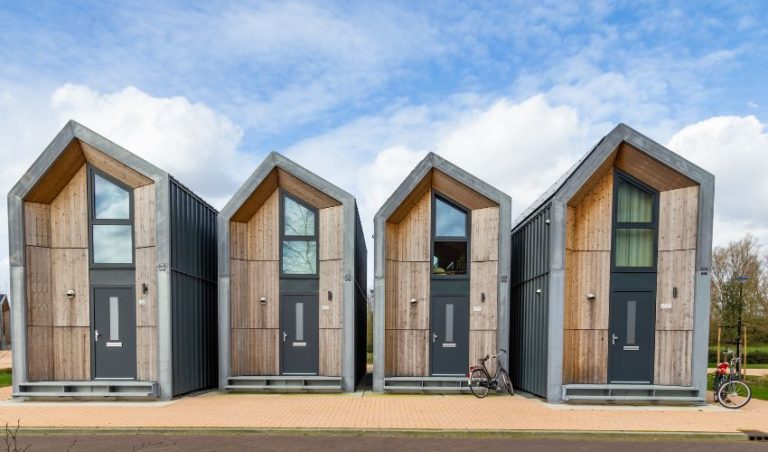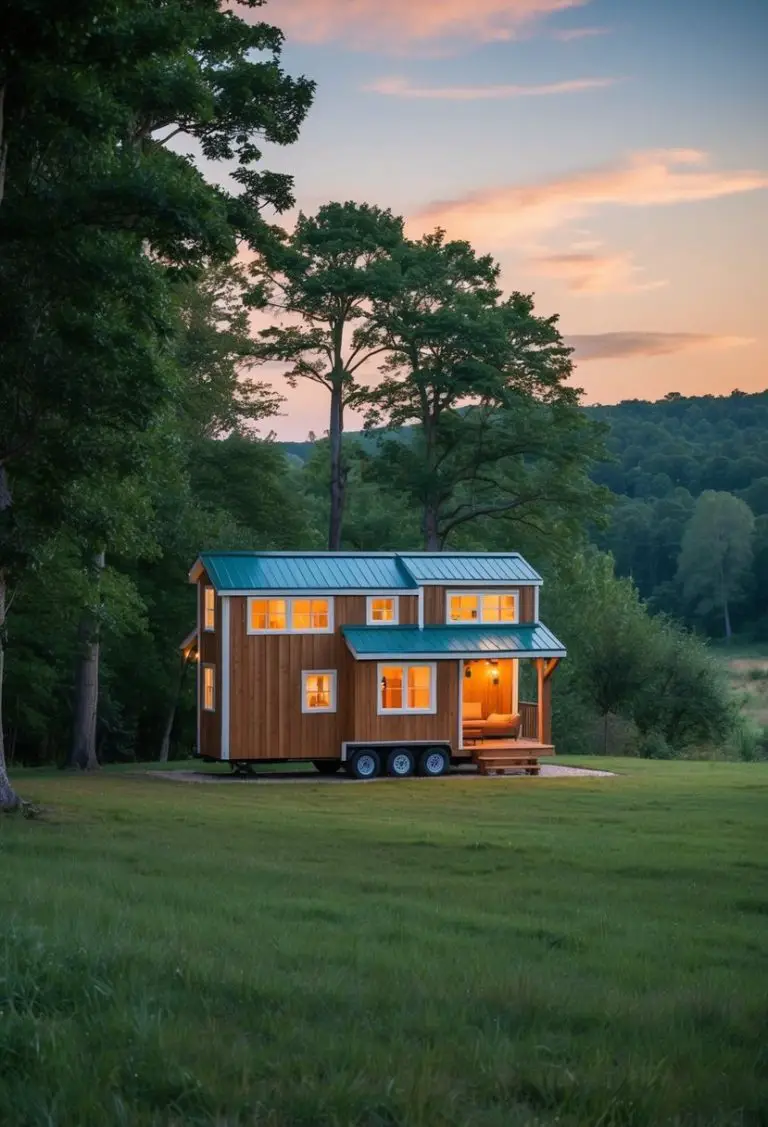What Michigan Cities Allow Tiny Houses: A Comprehensive Guide
Michigan, like many other states in the US, has seen a surge in the popularity of tiny houses. These small, compact homes are a more affordable and sustainable housing option for many people. However, finding a place to park or build a tiny home can be a challenge. In this article, we’ll explore which cities in Michigan allow tiny houses and the rules and regulations that govern them.
The tiny house movement is still relatively new in Michigan, and as a result, there are not many cities that have explicit regulations for tiny homes. However, there are a few cities that have taken steps to accommodate tiny houses. For example, Grand Traverse and Kalkaska have rules about where tiny houses can go, making it easier for people to find a spot for their tiny home. Additionally, Detroit has a subdivision of tiny homes built for low-income tenants by Cass Community Social Services.
It’s important to note that tiny homes in Michigan must meet all local building codes and zoning requirements. Couples can build a home of about 250 square feet, while houses for families of four must be at least 450 square feet. While it may be challenging to find a place to park or build a tiny home in Michigan, with some research and patience, it is possible to find a city that allows these unique homes.
Michigan Cities and Zoning Laws
Zoning Regulations for Tiny Houses
In Michigan, tiny houses must comply with local zoning regulations. The state has no specific laws governing tiny houses, so it is up to individual cities and counties to determine their own zoning requirements. Generally, tiny houses are subject to the same zoning regulations as traditional houses, including minimum lot size, setbacks, and height restrictions.
Tiny House Friendly Cities in Michigan
Some cities in Michigan are more welcoming to tiny houses than others. Detroit, for example, has no specific regulations for tiny houses, but they must comply with the city’s zoning laws and building codes. In Ann Arbor, tiny houses are allowed as ADUs (accessory dwelling units) on a property with an existing single-family home, subject to certain size and zoning restrictions. Traverse City allows tiny houses on wheels as long as they comply with local building codes and zoning regulations.
Grand Rapids is home to a tiny house community that features homes starting at $45,000. The community is located just outside the city and offers residents a chance to live in a small, sustainable home while still being close to the amenities of the city.
Building and Safety Standards
In addition to complying with local zoning regulations, tiny houses in Michigan must also meet building and safety standards. The state follows the International Residential Code (IRC), which sets minimum standards for construction, plumbing, electrical, and mechanical systems. Tiny houses must also comply with Michigan’s building code, which sets additional requirements for things like insulation and ventilation.
Overall, while Michigan does not have specific laws governing tiny houses, many cities and counties are open to the idea of tiny house living. As long as tiny houses comply with local zoning regulations and building codes, they can be a great option for those looking to downsize and live a more sustainable lifestyle.
Living in a Tiny House in Michigan
Living in a tiny house in Michigan can be an exciting and rewarding experience, but it’s important to understand the legal implications and permits required, community and lifestyle, as well as costs and taxes associated with tiny living.
Legal Implications and Permits
In Michigan, tiny homes must meet all local building codes and zoning requirements. Individuals must comply with the minimum size requirements, which is 70 square feet for a single person and 120 square feet for two people. Additionally, individuals must comply with local zoning codes that may have further restrictions on the placement and size of tiny houses. It’s important to research the zoning laws and building codes for the specific location where you plan to live.
Community and Lifestyle
Michigan has several popular locations for tiny homes, including Detroit, Grand Rapids, Ann Arbor, Traverse City, Lansing, and Kalamazoo. The Great Lakes and Lake Michigan also provide scenic locations for tiny home communities. Briley Township in the Upper Peninsula is a popular location for tiny homes due to its relaxed zoning laws. Living in a tiny house can offer a minimalist lifestyle, closer connection to nature, and a sense of community among like-minded individuals.
Costs and Taxes
The cost of a tiny home can vary depending on the size, design, and materials used. In addition to the cost of the home, individuals must also consider property taxes, sales tax, estate tax, and real estate transfer tax. Tiny homes can offer an affordable housing option, and some communities may offer reduced property taxes for those living in tiny homes. It’s important to research the costs and taxes associated with tiny living in Michigan before making a decision.
Overall, living in a tiny house in Michigan can be a unique and fulfilling experience, but it’s important to understand the legal implications and permits required, community and lifestyle, as well as costs and taxes associated with tiny living.
Frequently Asked Questions
Do I need a permit to build a tiny house on my property in Michigan?
Yes, you will need to obtain a permit to build a tiny house on your property in Michigan. The process for obtaining a permit will vary depending on the city or county in which you live. It is recommended that you check with your local zoning and building departments to determine the specific requirements and regulations for your area.
What is the minimum square footage for a house in Michigan to be legally recognized?
In Michigan, the minimum square footage for a house to be legally recognized is 70 square feet for a single person and 120 square feet for two people. However, it is important to note that local zoning codes may have additional restrictions on the placement and size of tiny houses.
Are there designated tiny house communities within Ann Arbor?
While there are no designated tiny house communities within Ann Arbor, the city does allow for accessory dwelling units (ADUs) to be built on residential properties. These ADUs can be used as a primary residence or as a rental property.
How does the Michigan tiny house law affect tiny home living?
The Michigan tiny house law allows for individuals to build and live in tiny homes that meet all local building codes and zoning requirements. Couples can build a home of about 250 square feet, while houses for families of four must be at least 450 square feet. It is important to note that individuals must comply with local zoning codes that may have further restrictions on the placement and size of tiny houses.
Can you provide a list of cities in Michigan where tiny houses are explicitly allowed?
While there is no comprehensive list of cities in Michigan where tiny houses are explicitly allowed, several popular locations for tiny homes include Detroit, Grand Rapids, Ann Arbor, Traverse City, Lansing, and Kalamazoo. It is important to check with your local zoning and building departments to determine the specific requirements and regulations for your area.
What are the typical costs associated with purchasing a tiny house in Michigan?
The cost of purchasing a tiny house in Michigan will vary depending on the size, materials, and location of the home. On average, a professionally-built tiny house can cost anywhere from $40,000 to $80,000. However, many individuals choose to build their own tiny homes, which can significantly reduce costs. It is important to budget for additional expenses such as land, utilities, and permits when considering purchasing or building a tiny home in Michigan.










